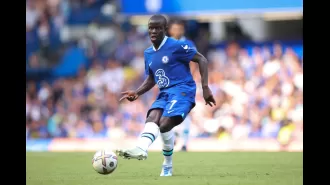A black man broke barriers in the CIA.
Former CIA employee Hocker was honored in the organization's museum during his return to headquarters, highlighting his esteemed career.
July 8th 2024.

In the year 1957, George Hocker achieved a groundbreaking milestone by becoming one of the initial Black officers to join the CIA. It was a friend of his who encouraged him to apply while they were both studying at Howard University. Although Hocker was initially selected for part-time duty, he soon realized that his Caucasian colleagues were receiving promotions and sponsorships while he was being overlooked.
However, despite these challenges, Hocker's esteemed career was recently honored by the CIA when he returned to their headquarters. They gave him a prominent place in their museum, marking another first in his remarkable journey. It is worth noting that Hocker remembers facing racist beliefs within the organization, with some people thinking that Black officers were incapable of being spies. He shared, "There was talk within the Agency that Black people couldn't be spies because they would stand out anywhere in the world... But then it hit me and a few of my friends - if anyone would stand out, it would be white men because the majority of the world's population is people of color. That's when I decided to break the stereotype and prove that we, as Black officers, can do this and the world needs us."
This became a recurring theme throughout Hocker's time at the CIA. He went on to become the first Black officer to complete the agency's paramilitary course, open a new CIA station, and become a branch chief within the Directorate of Operations. In January, Hocker wrote an op-ed for Newsweek, where he shared how attending the March on Washington in 1963 only strengthened his determination.
He recalled, "I joined the CIA in 1957 as a file clerk to earn money for my education at Howard University. But higher-ups told me that I could never become a spy because Black people were not smart enough and couldn't 'blend in' anywhere. Sadly, I believed them. However, everything changed for me at the March on Washington in 1963."
Hocker stood only 100 yards away from the legendary Dr. Martin Luther King Jr. as he delivered his iconic "I Have a Dream" speech. It was then that Hocker had an epiphany. He felt a surge of self-discovery and realized that he didn't have to succumb to the racist beliefs of others. He made a firm decision to become a spy and prove them wrong.
Throughout his career, Hocker served alongside other notable Black spies, including James Lafayette, an enslaved man who spied for America during the Revolutionary War, and Harriet Tubman, who worked as a conductor on the Underground Railroad and also spied for the Union during the Civil War. Hocker acknowledged the contradiction of serving a country that was simultaneously oppressing his own people. He shared, "While I was risking my life for my country in some of the most dangerous regions of the world, my fellow Black Americans were facing their own battles at home. The fight for civil rights and freedoms was often bloody. It was hard to ignore the fact that the same government that depended on me was also committing terrible acts that directly affected my loved ones. I myself had been a victim of police brutality as a teenager. I knew firsthand the struggles of being Black in America."
In conclusion, Hocker reflected on the experiences of other Black patriots who have served their country, such as James Lafayette and Harriet Tubman. He stated, "Being a spy for the United States doesn't mean blindly agreeing with everything it does; it means being a part of the effort to protect and improve our nation." It is clear that Hocker's journey, despite its challenges, is a testament to his unwavering patriotism and dedication to making a positive impact.
However, despite these challenges, Hocker's esteemed career was recently honored by the CIA when he returned to their headquarters. They gave him a prominent place in their museum, marking another first in his remarkable journey. It is worth noting that Hocker remembers facing racist beliefs within the organization, with some people thinking that Black officers were incapable of being spies. He shared, "There was talk within the Agency that Black people couldn't be spies because they would stand out anywhere in the world... But then it hit me and a few of my friends - if anyone would stand out, it would be white men because the majority of the world's population is people of color. That's when I decided to break the stereotype and prove that we, as Black officers, can do this and the world needs us."
This became a recurring theme throughout Hocker's time at the CIA. He went on to become the first Black officer to complete the agency's paramilitary course, open a new CIA station, and become a branch chief within the Directorate of Operations. In January, Hocker wrote an op-ed for Newsweek, where he shared how attending the March on Washington in 1963 only strengthened his determination.
He recalled, "I joined the CIA in 1957 as a file clerk to earn money for my education at Howard University. But higher-ups told me that I could never become a spy because Black people were not smart enough and couldn't 'blend in' anywhere. Sadly, I believed them. However, everything changed for me at the March on Washington in 1963."
Hocker stood only 100 yards away from the legendary Dr. Martin Luther King Jr. as he delivered his iconic "I Have a Dream" speech. It was then that Hocker had an epiphany. He felt a surge of self-discovery and realized that he didn't have to succumb to the racist beliefs of others. He made a firm decision to become a spy and prove them wrong.
Throughout his career, Hocker served alongside other notable Black spies, including James Lafayette, an enslaved man who spied for America during the Revolutionary War, and Harriet Tubman, who worked as a conductor on the Underground Railroad and also spied for the Union during the Civil War. Hocker acknowledged the contradiction of serving a country that was simultaneously oppressing his own people. He shared, "While I was risking my life for my country in some of the most dangerous regions of the world, my fellow Black Americans were facing their own battles at home. The fight for civil rights and freedoms was often bloody. It was hard to ignore the fact that the same government that depended on me was also committing terrible acts that directly affected my loved ones. I myself had been a victim of police brutality as a teenager. I knew firsthand the struggles of being Black in America."
In conclusion, Hocker reflected on the experiences of other Black patriots who have served their country, such as James Lafayette and Harriet Tubman. He stated, "Being a spy for the United States doesn't mean blindly agreeing with everything it does; it means being a part of the effort to protect and improve our nation." It is clear that Hocker's journey, despite its challenges, is a testament to his unwavering patriotism and dedication to making a positive impact.
[This article has been trending online recently and has been generated with AI. Your feed is customized.]
[Generative AI is experimental.]
0
0
Submit Comment





